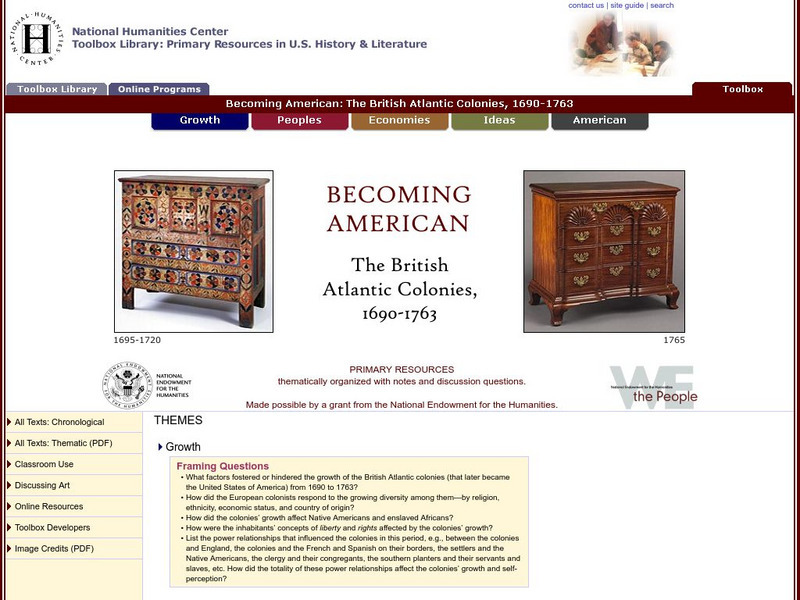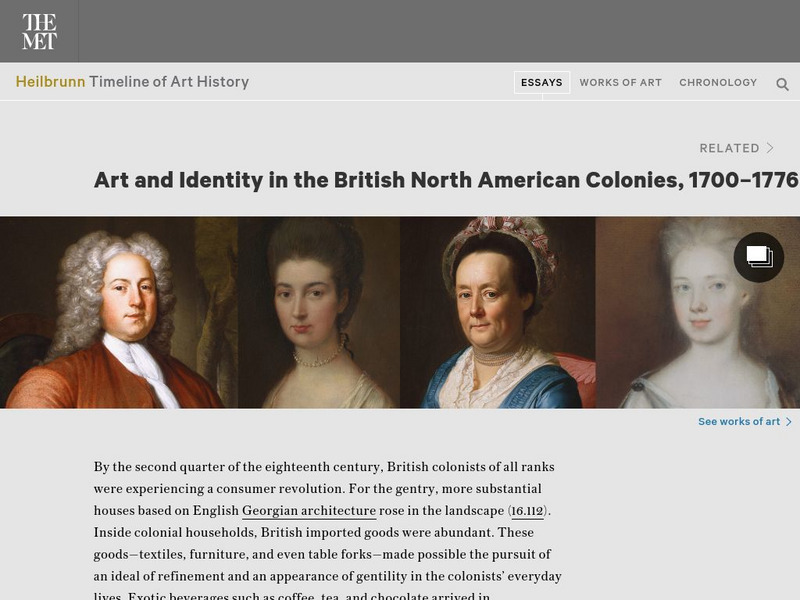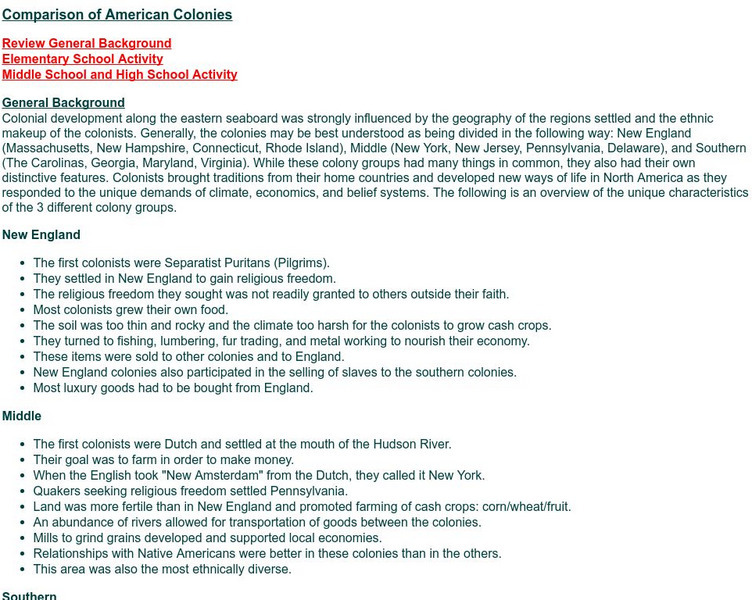Hi, what do you want to do?
Curated OER
Art Reflects Life
Fifth graders use the Internet to view collections of famous artists throughout the eighteenth century America. Using the artwork, they identify the themes that portrayed America as the land of opportunity. They record their findings...
Curated OER
Pocahontas: Ambassador to the New World
Young scholars watch the video "Pocahontas: Ambassador to the New World," complete a vocabulary list and discuss the video using the provided questions.
Curated OER
U.S. Quiz Questions
In this ESL United States worksheet, learners answer a set of 25 questions about the United States. The answers to each question are written beneath each.
Curated OER
What is the (No) Establishment Clause?
Students research and discuss the Establishment Clause.
Curated OER
Carolina Gold and the Gullah
Eighth graders investigate the physical geography of South Carolina to explore how it was suited for growing rice. They examine how slave labor contributed to a plantations success and compare Gullah culture from now to the past.
Curated OER
Knowing Where You Are
Students work together to research the names of places in their state. They divide up their state so that each group can research a different section and complete a chart of the different names. They create a key for the map to explain...
Curated OER
The Market for Moving People to America, 1610-1775
Students examine the markets that brought people to America. They identify the role of the immigrants in creating this country. They also analyze data to gather information about the time period.
Curated OER
Reading Comprehension: Simon Bolivar
In this reading comprehension/biography worksheet, students read 2 pages of information about Simon Bolivar. No comprehension questions are included, worksheets are for informational reading only.
Curated OER
Sparta and Athens
Sixth graders study Ancient Greece. In this Ancient Greece instructional activity, 6th graders complete 16 lessons to learn about Ancient Greece. Students complete a quiz for assessment.
Curated OER
On the Trail with Lewis and Clark
Eighth graders use the Internet to conduct research on the Lewis and Clark journals and work cooperatively in planning and delivering a presentation.
Curated OER
From Forest to Farm and Back Again
Learners review and discuss a given set of questions regarding ecosystems. They analyze essays, maps and historical documents on timber harvesting and regeneration and then complete worksheets.
Curated OER
A Share in America
Students examine map - reflect on why English colonist kept coming to America (scarcity of land in England / seemingly endless land in America)
Recite line from English poem. They discuss English attitude towards Indians and their lands.
Curated OER
Thanksgiving Word Scramble
For this word scramble worksheet, students unscramble a set of 15 Thanksgiving related words. Answers are included on page 2; a reference web site is given for additional activities.
Curated OER
Prepositions and Prepositional Phrases
In these prepositional phrases worksheets, students review the definitions and examples for prepositional phrases, prepositions, and object of prepositions. Students then complete three pages of activities for prepositions.
Curated OER
The First Thanksgiving: Crossword
In this Thanksgiving learning exercise, students use a set of 11 clues about Thanksgiving to complete a crossword puzzle; answers are given on page 2.
Curated OER
Washington's Birthday
In this word search worksheet, students find the answer to the 12 statements about George Washington by completing the word search puzzle.
CommonLit
Common Lit: Text Sets: The American Colonies
Collection of 14 Grade-Leveled texts (4-11) on the topic "The American Colonies." What was life like for European settlers in the New World? How did American colonies function before the Revolutionary War? Explore life in the...
National Humanities Center
National Humanities Center: Toolbox Library: Becoming American: The British American Colonies, 1690 1763
Explore these primary source documents detailing the growth, peoples, economies, and ideas relating to the British American Colonies in the 18th century. Features notes and discussion questions.
National Endowment for the Humanities
Neh: Edsit Ement: Empire and Identity in the American Colonies
In this lesson plan, students will consider "Empire and Identity in the American Colonies." The plan includes worksheets and other student materials that can be found under the resource tab.
Metropolitan Museum of Art
Metropolitan Museum of Art: Art and Identity in British North American Colonies
Consider the English identity of American colonists by examining the sorts of imported goods and decorative arts Americans chose to purchase and display.
Other
Sites Alive: Comparison of American Colonies
Lesson plan focuses on comparing and contrasting the unique characteristics of the original thirteen American colonies.
Louisiana Department of Education
Louisiana Doe: Louisiana Believes: English Language Arts: Grade 5: Forced Labor in the British North American Colonies
This sample task contains a set of primary and authentic sources about indentured servitude and slavery in the British North American colonies.
C3 Teachers
C3 Teachers: Inquiries: American Revolution
A learning module on the American Revolution that includes three supporting questions accompanied by formative tasks and source materials, followed by a summative performance task. Students investigate the question of whether the...
Massachusetts Historical Society
Mhs: Coming of the American Revolution: Stamp Act
Provides details surrounding the passage of another attempt by the British to tax the American colonies, the Stamp Act. Includes original supporting documents and great teacher resources.
Other popular searches
- 13 American Colonies
- American Colonies Map
- Early American Colonies
- Thirteen American Colonies
- The American Colonies
- American Colonies Project
- American Colonies Economy
- Growth of American Colonies
- Comparing American Colonies
- 13 American Colonies Slavery
- 13 American Colonies Map
- Life in the American Colonies



























